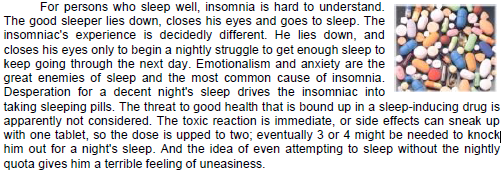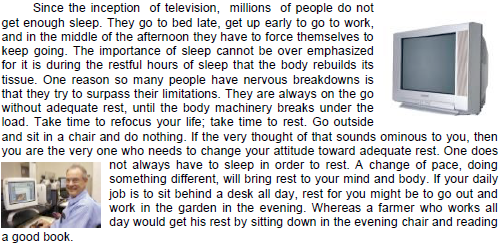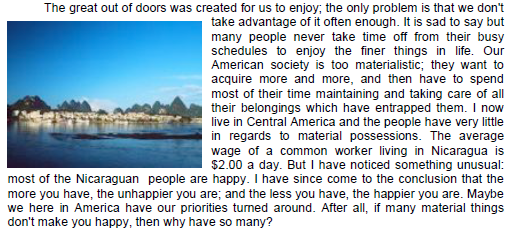PROPER REST
INSOMNIA AND SLEEPING PILLS
Almost 100 mil ion Americans occasionally suffer from insomnia; and another 20 mil ion complain of chronic sleep problems. Seven or eight times more women than men report sleeping difficulties. Americans take about 600 tons of sleeping pills a year. Side effects from sleeping medications are too numerous to mention, but a few are depression, skin rashes, poor coordination, digestive problems, respiration difficulties, etc.


PROPER REST IS ESSENTIAL
Rest is one of the most basic healers known to mankind. When you become sick, what is the first thing you do? You lie down in bed most of every day, as well as all the night, until you recover, because the restorative power of rest is the key to health. Every bodily power requires rest after exertion. Even your heart - the hardest working muscle in your body - rests after each beat. You rest at the end of each breath.
Your muscles require relaxation after every contraction. During the sleeping hours the body is busy repairing itself. Our bodies are a lot like a battery; They run down during the day and need to be recharged at night. The most energetic people I know are quite consistent in getting their rest.
One of the purposes of sleep is to repair losses and damage caused by work. When awake, we eat as well as work: that is, we both consume and replenish our stores of energy. But the food we take in is not available as energy until it has become a part of the living cell . Food in the stomach, in the blood and body fluids does not add to our store of energy until it becomes a part of the body. After it is digested, it must be assimilated; this work is largely done during sleep. This has been observed with the microscope. When the cell is fully rested, it is well filled with minute energy granules. A tired cell shows the granules greatly reduced in number.

REST FOR TENSION OR FATIGUE
Tension increases as the day goes on until it is at a high point in the late afternoon. If this point is reached day after day, week after week, the results may become unbearable. But if the person takes a break at noon with a short nap, the tension drops and he awakens for the afternoon's work with much improved nerves. The same rule applies to young mothers attempting to raise children, run a house and maintain an active social life. My advice to these mothers is to take naps with their children, for this will greatly reduce their tension and fatigue.
REST FOR THE EYES AND EARS
To protect your eyes, be careful to have the light coming over your shoulder on your reading or your work, and not into your eyes. Be sure you have plenty of light. Don't try to read in dimly lit rooms.
Fluorescent lights ruin the eyes as they blink on and off 60 times a second. Whenever possible use outside light for reading and working. If you have to spend many hours of reading, occasionally give your eyes a rest by looking out the window, closing them, or doing some eye exercises.
Various forms of noise present in our modern age is one of the greatest enemies of rest. Noise acts as a constant irritant to the entire nervous system of the body, whether we are asleep at night, or during the day when we are awake. Eighty decibels represent the level at which continuous or prolonged exposure to noise can result in hearing loss.

Noise has been shown to increase the stress level of those continually exposed to it. Those who work 20 years or more around noisy equipment have a life span 5 years shorter than those working in quieter areas of the same firm. Television almost consistently raises the stress hormone level in the blood regardless of the programming. Rock music has also been shown to affect the body's stress level adversely.
HOW MUCH SLEEP DO WE NEED?

When anxieties, cares and business perplexities are carried to bed, sleep during the early hours is not refreshing and the time of sleep is necessarily extended. The occupation during the day likewise regulates the amount of sleep at night. Brain workers, and those undergoing severe nervous strains, require considerable sleep: their fatigue is mental and nervous, and sleep is the only form of rest that is beneficial. People who are doing manual labor, usually fail to sleep readily upon retiring and don't require as many hours of sleep.
STAGES OF SLEEP

Within an hour or so of falling asleep, the sleeper rapidly progresses through three stages until he gets to the deep sleep stage, then they reverse until he gets back to the light stage. This first sleep cycle (stages 1, 2, 3, 4, 3, 2, and REM) are completed 70-80 minutes after falling asleep. This complete cycle is repeated four to five times a night. The second cycle usually lasts about 110 minutes and the third cycle about 120 minutes, but the later cycles are shorter, approximately 90 minutes each.
This is why sometimes in the middle of the night you wake up (you're in the light stage) and it takes you some time to fall back to sleep. If the phone rings and wakes you up during the first stage, the light stage, you are alert, but if the phone rings and wakes you up during stage 4, the deep stage, it takes you a while to get your thoughts together. Some individuals, awakened during the deep stage, answer the phone and the next morning don't even remember they had a phone call during the night. sweet"
NATURAL WAYS TO HELP ONE SLEEP
. Only those who use their muscles during the day in physical work can enjoy sweet sleep at night. If you are a sedentary worker, then in the evening spend at least one hour outside, go for a walk, mow the lawn, wash the car, work in the garden, paint the garage, etc;, do some physical work before going to bed.

Tobacco, caffeine (as found in coffee, tea, colas) chocolate, sugar, fatty foods, chemical preservatives, additives, etc. can stimulate the body causing insomnia. It is true that food puts you to sleep at first, by diverting the blood from the head; but it disturbs sleep later in the night. When you eat a large meal before going to bed, the food has to be digested and the stomach fails to get its proper rest. The sleep is disturbed, the brain and nerves are wearied, the appetite for breakfast is impaired and the whole system is unrefreshed and is unready for the day's duties. If you go to bed with an empty stomach, you can often get along well with six or seven hours sleep: but if you go to bed after a big meal, you usually need from eight to ten hours sleep.
Plenty of fresh air in the sleeping room is an important part of the rejuvenating effect of sleep. Your body is working less, and the air you breathe is used to restore and rebuild body tissue. Therefore, be sure there is a current of outdoor air (even in the winter) entering your room while you sleep. If you do not have fresh air at night, you will tend to awake tired and exhausted.
Neutral temperature baths, between 92 - 95 degrees, for 10 minutes or more are excellent for relaxing and calming the mind, and preparing one for sleep. Herb tea made from either hops or catnip will usually help one to sleep. Bring 8 oz. of distilled water to a boil, turn the heat off, add 1-1/2 tsp. of herb and let steep for 20 minutes. Strain and drink it one half hour before bedtime.
The most healthful position for sleeping is upon the right side with the limbs extended as much as possible. This position avoids pressure upon the heart, keeps the heavy liver (which is the largest organ in the body), downward, and affords the stomach the fullest freedom. While lying upon the side, the pillow should be of sufficient size to keep the head in its natural relationship to the shoulders. You should not use more than one pillow. The object is to get in the correct position so that the spine is straight. Contrary to popular belief, the mattress should not be firm, but fairly soft. The best type of mattress is a foam mattress, or one can use a firm mattress with a thin egg crate mattress on top.
RECREATION IS A FORM OF REST
Recreation is a vitalized form of rest. A change of activity is needed from time to time. We need variety in our lives; that is why it's good to get away from the normal routine occasionally, such as a weekend trip to the mountains, or sea shore camping with the family. Eating good natural food cooked over a campfire, sleeping in the great out of doors, getting plenty of fresh air, being away from all the traffic noises such as sirens, relaxing and enjoying the birds singing, soaking up the sun, or going for a swim in the ocean or lake are various ways to rest and relax.












